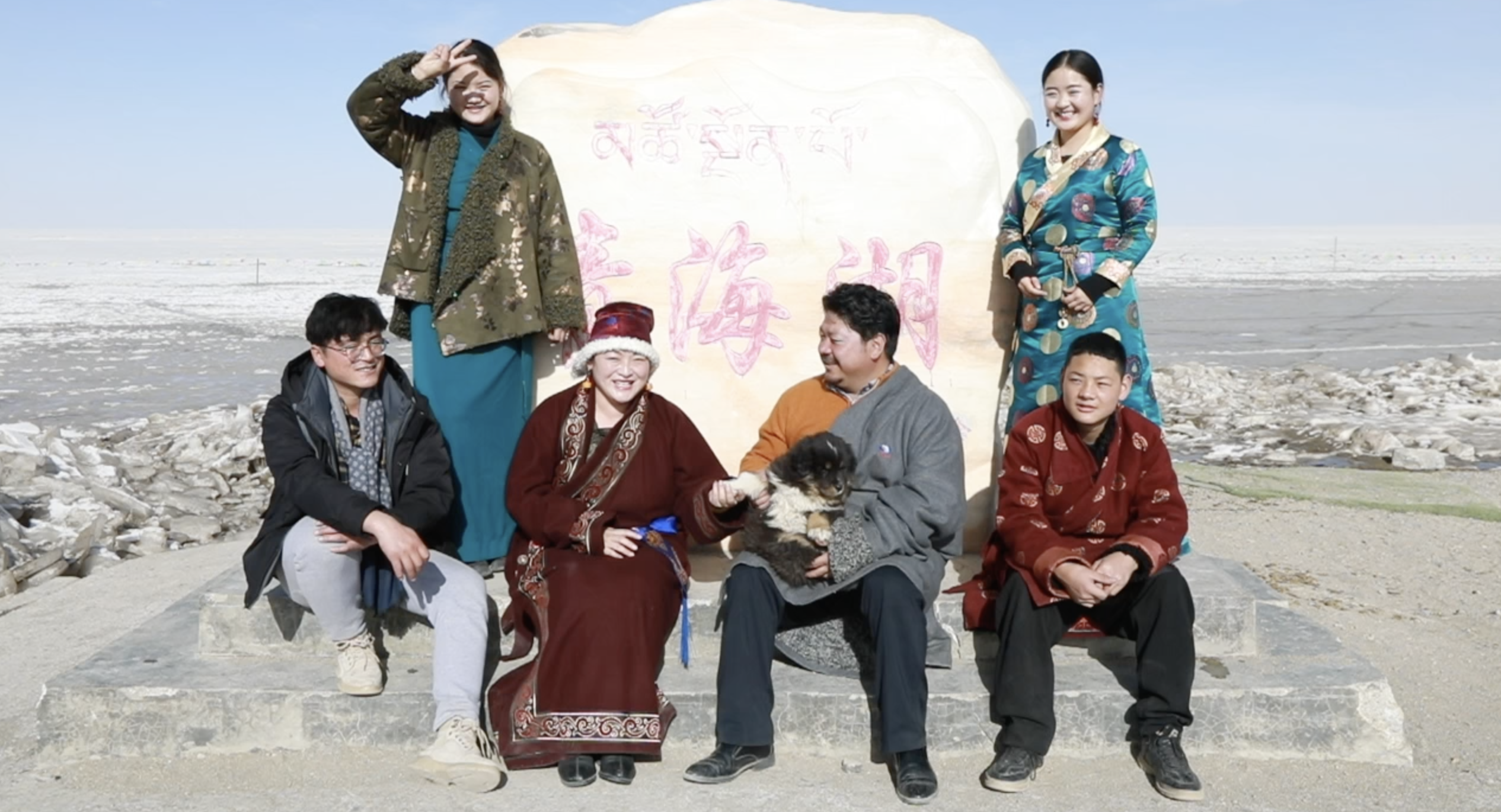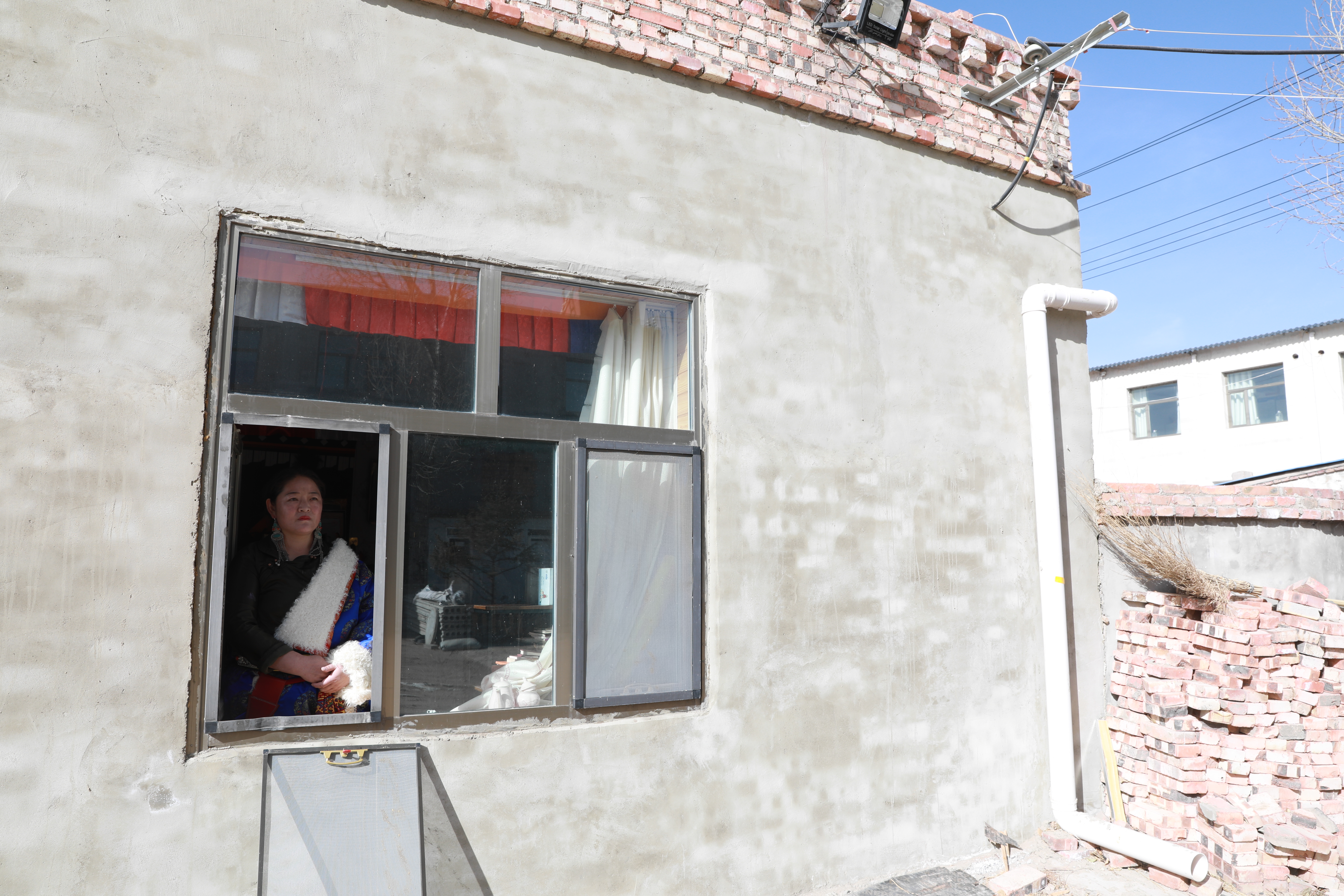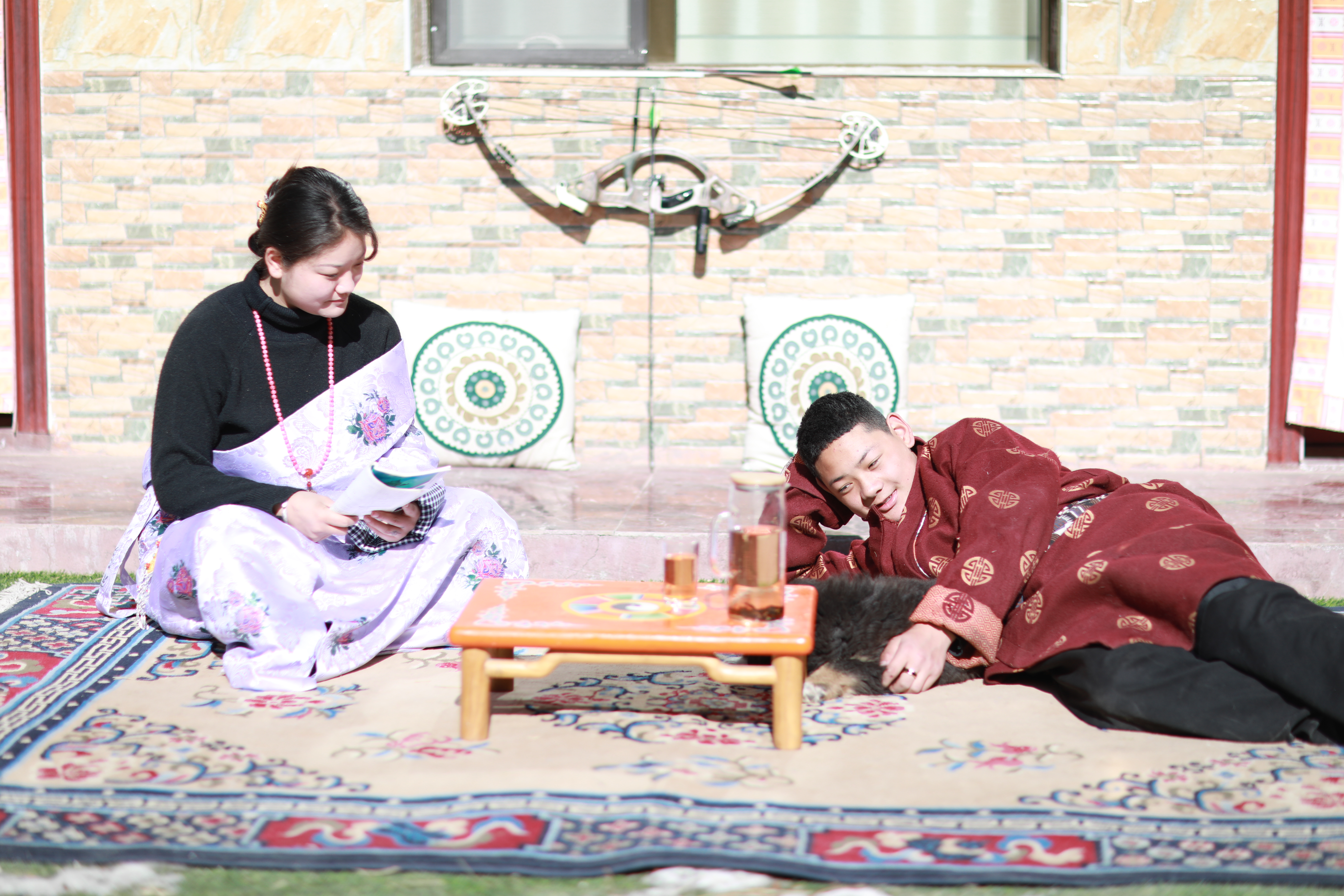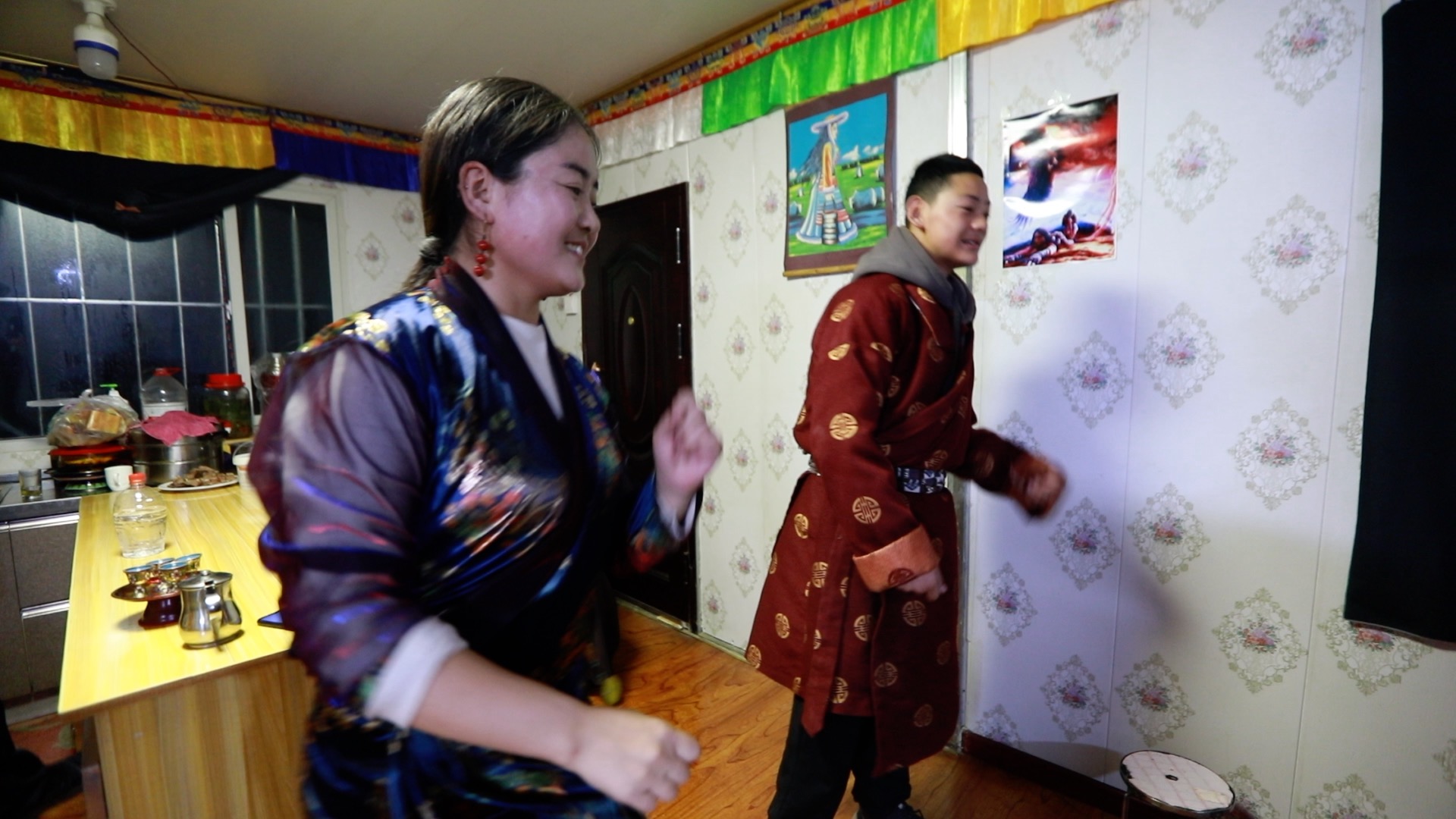06:04

After driving three hours uphill from Xining airport, we arrived at Tashi Drolma's home perched by Qinghai Lake. The matronly livestreamer came out of her tidy square yard looking radiant and joyful.
It was freezing yet refreshing on the plateau some 3,500 meters above sea level in late January. The air was rarefied, even more so during the winter, making it hard for us newcomers to breathe. In minus 20 degrees Celsius, it was off season for locals who largely live on farming and herding in the warmer months. There was hardly anyone on the street leading to the pristine Qinghai Lake, where hordes of tourists would leave their footprints during the summer months.
Tashi Drolma's family house covers a good chunk of land but only one room about 27 square meters is for her, her husband and their two children. "Please sit," the 37-year-old Tibetan woman said in vernacular Mandarin that she just learned to speak a year ago. Her husband Phunmon Dorje, a rather large man, was busy putting briquettes in a big coal stove to heat up the living room that is their parlor, bedroom, kitchen and dining room.
While Tashi Drolma poured yak butter tea for us, her cousin-in-law and her two children were making dumplings for dinner – a luxury they would indulge in only when there's a guest coming over. Peals of laughter sounded, mingled with Tibetan melodies, lulling us into a very cozy, carefree world.
It's a place that feels pure, an impoverished yet promising world far from urbanization, smog and the madding crowd. But it's also a segregated world that relegates women to a lesser role, one that is confined to serving men, to giving birth, to seasonal labor. There's a woman who died over disease at the age of 25 who refused to disrobe for a gynecological examination. There's a woman who is confined by her husband without food or drink for not giving birth to a boy. There's a woman who attempted suicide over an improperly cooked meal.
This could happen to any woman in town, said Tashi Drolma. Jiangxigou Township is the most impoverished place in Hainan Tibetan Autonomous Prefecture of Qinghai Province. People live a near-subsistence lifestyle of isolation, and also live in a culture of male chauvinism. "Most women here think it makes perfect sense," the warm hostess exclaimed.

Tashi Drolma's family photo taken by the side of Qinghai Lake (L-R front row: cousin Dorje Tsering, Tashi Drolma, Drolma's husband Phunmon Dorje, Drolma's son Sangye Dongdri; L-R second row: Drolma's daughter Jamyang Drolma, Drolma's cousin-in-law Dorje Drolma), in Hainan Tibetan Autonomous Prefecture, northwest China's Qinghai Province, January 25, 2021 /CGTN
Tashi Drolma's family photo taken by the side of Qinghai Lake (L-R front row: cousin Dorje Tsering, Tashi Drolma, Drolma's husband Phunmon Dorje, Drolma's son Sangye Dongdri; L-R second row: Drolma's daughter Jamyang Drolma, Drolma's cousin-in-law Dorje Drolma), in Hainan Tibetan Autonomous Prefecture, northwest China's Qinghai Province, January 25, 2021 /CGTN
Women born and raised in the region are ashamed of periods due to ingrained stigma surrounding menstrual blood. What's more, it's difficult for them to ask their husbands for a few bucks to buy sanitary pads due to shame over period stains.
"My mother is a case in point. She had abnormal uterine bleeding for three months but refrained from telling anyone. She took out bits of cotton from a ragged quilt and used it as a sanitary pad, until my maternal grandma found something wrong. I rushed my mother to the hospital where the doctor said she would have died of tumors in her uterus a few days later," Tashi Drolma recounted. She couldn't figure out exactly which year the incident happened, as most women here don't know about numerical things like dates or money. "It might have been seven or eight years ago." Her mother had her uterus removed at a hospital in Xining – the provincial capital, and came through. But survival matters little to the woman who's been dismissed by her husband all her life for failing to give birth to a boy.
As the only child in the family, Tashi Drolma tried hard to prove to her father that she's no worse than a boy. "I could carry a gunny bag of 100 kilos in my teenage years."
Amid her father's beating, taunting, scolding of her mother as well as contempt directed toward her every day, she found respite whenever she would help her grandpa watch over the livestock grazing beside Qinghai Lake, where the wise man would share many ancient Tibetan myths.
The obstinate girl didn't enter primary school which actually was a literacy class at the age of 13, and got married at 17 through a family arrangement – right about when she received her primary school diploma. "For the first month into the marriage, I was too embarrassed to raise my head to look at Phunmon Dorje. Back then, it was difficult for us to look at a strange man," she said, her face blushing.

Tashi Drolma looks out of the window for the room of her home, in Jiangxigou Township, Hainan Tibetan Autonomous Prefecture, northwest China's Qinghai Province, January 26, 2021. /CGTN
Tashi Drolma looks out of the window for the room of her home, in Jiangxigou Township, Hainan Tibetan Autonomous Prefecture, northwest China's Qinghai Province, January 26, 2021. /CGTN
Day by day, Tashi Drolma lived the age-old life: putting cattle and sheep out to pasture, digging for caterpillar fungus, planting highland barley, doing house chores and handcrafts, and looking after children. Businesses were the domain of men. Phunmon Dorje, now 43, often leaves home to provide labor on temple restoration sites. The family would take care of the store they own outside of the house during summer months when travelers abound.
Among over 3.1 million Tibetan females, nearly a half have the given name of "Drolma." And "Drolmas" live similar lives confined at and around the home.
It's a place where we all get hitched at an early age, where we are taught to sleep in an upright position or we won't be able to be married off, where we can't eat at the table, where a divorced woman is viewed ominous and can't attend weddings.
- Tashi Drolma
Venturing beyond
Change came in 2017, when Tashi Drolma traveled out of Qinghai for the first time in her life.
Back then, her daughter Jamyang Drolma, who's currently in the last year of high school, said she wanted to buy a shirt on Taobao, e-commerce tech giant Alibaba's online shopping website. Tashi Drolma was suspicious about making a purchase from a virtual store but agreed to let her daughter try. "To my surprise, the shirt arrived three days later and the quality was very good."
Then the family had the idea to open an e-commerce store selling local products like yellow mushrooms, caterpillar fungus and yak meat, as their brick-and-mortar has no business most of the year. To get started, Tashi Drolma and her husband flew to city of Jining in eastern Shandong Province to get help from their daughter's former volunteer teacher Gong Haitong, who suggested that they use livestreaming to sell their items.
Back home, she spent days figuring all of this out. "During our visit, Gong's father was in the kitchen cooking while the women were sitting and chatting. I felt that the family was very disrespectful for having a man in the kitchen," Tashi Drolma said. She told the story to her daughter who said firmly, "We'll also live a life like that."
She started to learn how to speak Mandarin by watching news programs and TV shows. She was so determined that she watched the 76-episode drama "Empresses in the Palace" 36 times until she could "speak" with the heroine. Among the multiple characters, she told us she favored an empress who dare to love and hate, and fight against established practices. "Love and hate have nothing to do with us Tibetan women."

Jamyang Drolma is reading a book and her brother is enjoying a relaxed time with a little Tibetan Mastiff in the yard of their home, in Jiangxigou Township, Hainan Tibetan Autonomous Prefecture, northwest China's Qinghai Province, January 25, 2021. /CGTN
Jamyang Drolma is reading a book and her brother is enjoying a relaxed time with a little Tibetan Mastiff in the yard of their home, in Jiangxigou Township, Hainan Tibetan Autonomous Prefecture, northwest China's Qinghai Province, January 25, 2021. /CGTN
She kept reading Chinese texts and writing Chinese characters together with her son, a primary school student. At age 36, she could speak fluent Mandarin.
All the while, she worked hard to present the best of herself in front of a smartphone – a gadget most rural Tibetan women covet. Finishing a livestreaming session that lasts six hours from 18:00 till midnight, she would make accessories with agate, carnelian, enamel or other gemstones that are abundant across the plateau for a couple of hours.
Nonetheless, she halted the fledgling undertaking only three months later. "Neighbors saw me as either a psycho or a prostitute. A rumor quickly spread that I would soon leave for another man, a rich man," Tashi Drolma said wryly. Once, Phunmon Dorje passed her a glass of water during her livestreaming – that small gesture quickly became the talk of the town. "Tashi Drolma is a dissolute woman." "Phunmon Dorje can't control his wife." "He's timid and useless."… Such attacks ultimately put an end to Tashi Drolma's short-lived career, despite her husband's support. "Don't take it seriously. It's none of their business," the veracious man repeatedly comforted his wife.
Months later there came a new town mayor who knew about the internet and livestreaming sales. "He came here, telling us there's a national project aimed at reducing poverty through e-commerce and that it's appropriate to put the credential in our home."
Tashi Drolma began again. With a liveliness and sincerity, she quickly gained the trust of her customers and even became friends with some of them. On a good night, she could make as much as 10,000 yuan ($1,546), with a large portion from selling rare medicinal fungus. Digging for the fungus is dangerous. "We usually go into the mountains to dig fungus starting March of every year. For a month thereafter, we dig for the herb in the daytime and sleep in a tent at night in the mountains where wolves and bears appear from time to time. Last spring three villagers were eaten by a bear," Tashi Drolma said, in a scratchy voice. She had a tumor in her throat for a couple of months but couldn't get it diagnosed at local hospitals.
As more villagers, mostly came to ask her to help them sell leftover edible fungus, handmade accessories and sewn goods. As of our visit, she's helped over 500 households sell their items. Even villagers living over 40 kilometers away had come over.
01:26

Inspiration to her family
Tashi Drolma's trailblazing success not only upended the norms of womanhood in the region and beyond, but inspired those around her to follow in her footsteps. We were able to sit in on a livestreaming session by another "Drolma" in the family – Dorje Drolma, Tashi Drolma's cousin-in-law. She has a lively onscreen persona, often doing Tibetan dances on a whim before her smartphone.
"My parents-in-law were strongly against it at first as they thought it frivolous for a woman to appear in front of people other than her family," Dorje Drolma said, while busy cooking and boiling tea for us. "They gradually changed their attitude because my sister (Tashi Drolma) did it quite well."
After learning about livestreaming at Tashi Drolma's for a few months, the money started coming in, and she would be able to buy diapers and milk powder for her children, contributing to the family's finances.
The 29-year-old mother of two didn't talk much until we mentioned Dorje Tsering, her husband. "I'm the lucky one. I was able to marry out of love rather than family arrangement." Dorje Drolma and her husband met at a petrol station where she'd worked after dropping out after the first year of high school. Back then, she had to quit to provide for her younger sister and brother who got better scores than her.
"We fell in love at first sight and got married years later," she choked with sobs, tears rolling down her cheeks. "He never beats me. Most of my friends suffer family violence, like many women do in our society." Her husband went to college and has the progressive mentality that comes with higher education. For the most part, her marriage is one based on love and equality. "He would help me with housework when my in-laws aren't home."
But for most of the time when his parents are home, she has to do them all by herself to stick to tradition, such as cooking every day for a family of eight – she even cooked for 30 people when friends and relatives came over to help renovate the house.
As for livestreaming, Dorje Drolma sees it not only as an opportunity to make money, but a window to a world where she hopes to explore one day, given that she has never left Qinghai.
"In a livestreaming session, there was even a foreigner teaching us how to speak English," she said excitedly.
In this small room, I can see the outside world.
- Dorje Drolma
Breaking the Cycle
Jamyang Drolma – is also inspired by her mother Tashi Drolma's fierce independence. The high school senior learned from her mother that once you decide to do something, you have to stick to it. "My mom is a 'superwoman' who does things her peers in the village dare not."
Jamyang's admiration for her mother is further fueled by her classmates, who adore Tashi for making a living by livestreaming on Taobao, unlike their mothers who still tend exclusively to their husbands and family.
The modus operandi of the family has an imperceptible influence on their children. Jamyang Drolma said her younger brother would often cook for her and they share housework after school. "Men and women have the same status. Women contribute a lot," their father said.
Since 2009, children in Qinghai's Tibetan prefectures have started 15-year elementary and middle school education for free, largely putting an end to illiteracy among the younger generation on the pastoral plateau.
Coming along with education for all and greater economic development is a change in perception regarding gender.
My mother is a superwoman. She did all the things other women in our village dare not.
- Jamyang Drolma
Jamyang Drolma's dream is to go to university outside of Qinghai this summer, pursuing either law or teaching. "Being a lawyer can uphold justice, and if I become a teacher, I can come back here to help improve education in rural areas."
The three "Drolmas" of the family are certainly pioneers in their village, embracing technology to make a living in a rigidly hierarchal culture that shames women for doing anything but clinging to the family, that wears away their identities, their very selves.
These women have broken the mold – the long-revered lauded cultural ideal of womanhood. This, however, doesn't diminish their devotion to their families. This dynamic suggests that uplifting female role models can be progressive and traditional all at once, breaking barriers while walking a delicate line to appease loved ones. There is no right or wrong way to move forward, yet the three "Drolmas" have shown us and those around them what courage can achieve.
Reporters: Bi Junxin, Wang Xiaonan, Zhu Danni
Video directors: Zhu Danni, Wang Zeyu
Writer: Wang Xiaonan
Videographers: Zhu Danni, Wu Jinjing
Voiceover: Zhu Danni
Post-production music and cover designer: Wang Zeyu
Producer: Wang Xiaonan
Supervisor: Zhang Shilei

